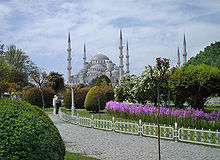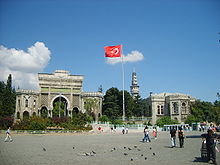
Information infrastructure (stage 4)
Turkey has had internet access since 1993, although testing at Ege University started in 1987. First available was dial-up connection, cable internet has been available since 1998 and ADSL since 2003.Currently Turk Telekom's Ttnet ADSL2+ service is the most widely used internet service in After June 2009, 3G Mobile Networks approved from Ministry of Transport and Communications, Mobile Networks started to raise their popularity in Turkey. However all of the high speed internet solutions have quotas, except 1MBit packages. Because of the inadequate infrastructure, almost every internet line is transporting over the copper lines.
Internet Access (Stage 4)
Most hotels, inns, pensions and hostels either have a computer dedicated to the Web and email for guest use or the owner will allow you to use an office computer. If you travel with your own laptop computer, most hotels, particularly the small and medium-sized ones offer fast wireless Internet access in at least one public space, such as the lobby or lounge. More and more hotels have repeaters that convey the signal to all the guest rooms as well.
Speed and Quality (Stage 4)
Turkey is offering speeds from 1 mbit/s to 8 mbit/s. TTNET offers VDSL2 service with speeds at 16 mbit/s to 32 mbit/s as well. Alternative broadband companies, while mostly still using TTNET infrastructure, such as SmileADSL and Biri are also available. Tellcom is offering fiber broadband in very limited areas in a few cities, though the company is enlarging at a healthy pace. They currently offer up to 100 mbit/s speeds. Additionally, relatively wide but not universal coverage of cable internet is maintained by UyduNET, offering speeds from 1mbit/s to 20mbit/s.
Wireless Access
A new communication system developed by Turkey's leading electronic defense company ASELSAN has turned the new generation wireless into a mobile phone. With ASELSAN's new infrastructure, wireless devices will be able to send text messages like mobile phones and transfer data such as photos and videos when used as modems. In an effort to provide continuity of communication during disasters, crises or terrorist attacks, ASELSAN has been working on a new digital wireless system for the last 10 years. Nearly 50 engineers worked in the software development process and 40 million USD was spent for Research & Development practices.
Hardware and software (stage 3)
Demand for computer software in Turkey will continue to show strong growth over the next few years. The Turkish government is encouraging more widespread use by levying very low import tariffs on computer equipment and software. At present, wide spread piracy of both domestic and foreign computer programs is the main drag on increased software sales. Software is often bundled with computer sales. Specialized / customized software tends to dominate the import figures. The manufacturing sector is th e largest user of computer software in Turkey, followed by the finance and education sectors. Despite the copyright situation, several major U.S. companies maintain marketing offices in Turkey.
Service and support (stage 4)
The service sector in Turkey has a great potential for development in the years ahead thanks to the availability of its educated, qualified and young labor force, the high number of both universities and schools providing vocational education, the accessibility of the high value-added call center services and the existence of a large number of foreigners living in Turkey, as well as the facts that Turkish people do not speak foreign languages with a distinguishable accent, the country is extremely attractive for foreign investors and that a great many investors designate Turkey as the center for carrying out their operations in other countries.

